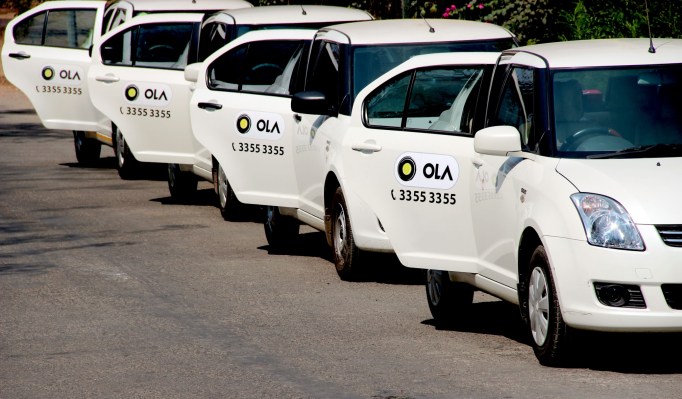While Uber dukes it out in China against Didi Kauidi, a homegrown rival in India is also piling pressure on the U.S.-based transportation app with global ambitions. Ola, a taxi app backed by the likes of Softbank and DST Global (coincidentally also both backers of Didi Kauidi), is launching a new shuttle service to complement and expand on its taxi offering, with rides costing under $1.
Ola Shuttle will be announced officially on Wednesday. The service will available initially in two areas, Bangalore and Gurgaon (near Delhi), when it goes live on September 21 with 500 shuttles covering 100 routes. Further cities will be announced in the next quarter.
The move comes as we’ve heard that Ola is in the process of raising yet another round of funding, on the heels of closing a $400 million round at a $2.5 billion valuation in April of this year.
While companies like Uber are on a march to expand into ever more countries, Ola is focusing on dominating its home market. India is one of the fastest growing economies in Asia, with a population of nearly 1.3 billion and a rapidly evolving middle class armed with smartphones and disposable income.
Sundeep Sahni, VP of New Initiatives at Ola (who was a co-founder of Rocket Internet’s Lazada before he joined Ola earlier this year), says that the shuttle service will target commuters who might otherwise opt for taking their own cars, bikes or auto-rickshaws. Rides will cost less than $1 (66 rupees), compared to the average $4-$6 price of a ride in a private taxi.
In exchange for sharing your space with between 12 and 20 other people, the shuttles will come with air conditioning, WiFi access, and in-vehicle entertainment, he says. (For those in the U.S., it’s not unlike the service Via, which is offering an urban shuttle service initially in NYC.)
“Millions of Indians undertake their daily commute in our cities using their own vehicles, cabs or other modes of personal transportation,” Bhavish Aggarwal, co-founder & CEO at Ola, said in a statement to TechCrunch. “With Shuttle, we intend to create a comfortable and reliable commute experience for them at the tap of a button on their smartphones. This will bring in efficiencies at scale, for suppliers who will work with us and will help enable mobility for a billion people.”
The shuttle service follows a pilot covering 20 routes and 100 shuttles, and it will work not unlike the basic Ola service in terms of corralling suppliers: the shuttles will be either sole-traders with their own vehicles or limited fleets from outfits significantly smaller than Ola that will link into Ola’s app to find passengers.
Passengers, in turn, can use the app to track shuttles on the map, book their seats and pay for the ride.
Scale for the future
Ola’s move to expand to shuttles comes at a key time for the company. When Ola raised its $400 million Series E round — rounding out its total funding at nearly $680 million — it did so with the aim of using the funds to aggressively scale the company. Sahni says that at least $50 million will be invested in the new shuttle service.
Currently Ola’s app — which already covers traditional taxis, autorickshaws and other private vehicles — is live in over 100 cities in India, and the company says that it serves 750,000+ rides each day with 250,000+ vehicles registered on the app and adding some 1,500 per day on average. It’s also taken a page from Uber’s playbook and moved into other areas like food delivery.
As with Didi Kuaidi in China, Ola’s rivalry with Uber is more in anticipation of what may be to come, rather than the state of the market today: Ola’s total share of vehicles on the streets today works out to around 80% says Softbank, putting it well ahead of its closest rival Meru at 12%, giving the company the bigger platform to seize whatever opportunity there may be to target India’s
That’s not to say that there aren’t other services out there that might rival Ola Shuttle, or companies that might not decide to launch a similar service to compete with it.
Meru launched a carpooling service in July; TaxiForSure (owned by Ola) also has a carpooling offer; and BlaBlaCar, which launched in India in January 2015 (and is raising more money too) also offers shared-riding services. RedBus focuses on rides between cities but could also potentially look to expand that into commuting shuttle services.
But none of these are shuttle buses as such, a point that Sahni likes to emphasize, too. “There isn’t anyone working on shuttle services in India at this scale. This organized shuttle service will be the first of its kind,” he says. “We have a huge first-mover advantage.”
